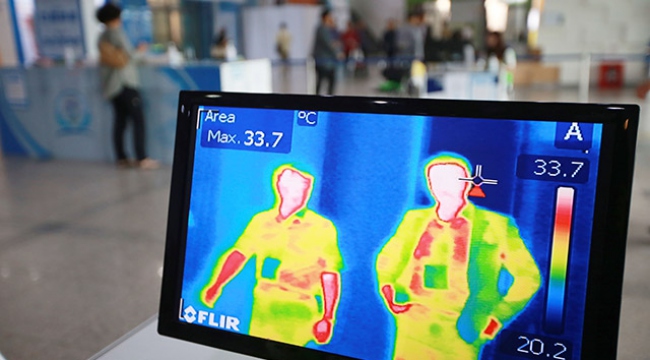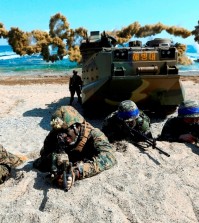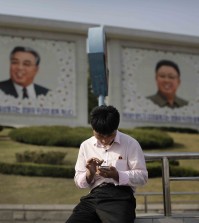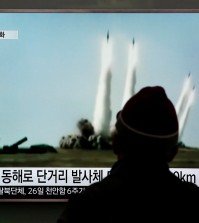- California Assembly OKs highest minimum wage in nation
- S. Korea unveils first graphic cigarette warnings
- US joins with South Korea, Japan in bid to deter North Korea
- LPGA golfer Chun In-gee finally back in action
- S. Korea won’t be top seed in final World Cup qualification round
- US men’s soccer misses 2nd straight Olympics
- US back on track in qualifying with 4-0 win over Guatemala
- High-intensity workout injuries spawn cottage industry
- CDC expands range of Zika mosquitoes into parts of Northeast
- Who knew? ‘The Walking Dead’ is helping families connect
S. Korea installs MERS detection devices in N. Korea

A thermal camera monitor shows the body temperature of visitors during the Job Fairs in Seoul, South Korea Friday, June 5, 2015. Sales of surgical masks surge amid fears of the deadly, poorly understood virus. Airlines announce “intensified sanitizing operations.” More than 1,100 schools close and 1,600 people – and 17 camels in zoos – are quarantined. The current frenzy in South Korea over MERS brings to mind the other menacing diseases to hit Asia over the last decade – SARS, which killed hundreds, and bird flu. (Yonhap)
SEOUL, June 8 (Yonhap) — The Unification Ministry said Monday it plans to install devices to detect the MERS virus at the joint industrial zone in North Korea later in the day to prevent the spread of the virus there.
At the request of the North, South Korea has lent Pyongyang three thermal scanners for those who travel in and out of the Kaesong Industrial Complex, where about 53,000 North Korean workers are employed, ministry spokesman Lim Byeong-cheol said in a press briefing.
“The government plans to install the thermal scanners in the North later in the day. Specific places for the installment will be made public,” Lim said.
Concerns about the spread of the Middle East Respiratory Syndrome are growing in the South as the virus has killed six South Koreans so far, while the number of those infected has increased to 87.
The communist country has been highly sensitive to the outbreak of contagious diseases due to its weak health care system. Last year, Pyongyang imposed an entry ban on foreign tourists for about five months due to concerns over the deadly Ebola virus.
This is not the first time that Seoul has provided such devices to Pyongyang at the North’s request.
In November, the South lent three thermal scanners to the North when fears of the Ebola virus gripped the world. In 2009, the North made a similar request to the South over concerns of avian flu.
A group of 124 South Korean firms operating at the complex is also likely to provide masks to the North Korean workers, it said.
Touching on a wage row at the zone, Lim said that there has been no progress over wage talks between the quasi-state committees of the two Koreas. The two countries have been embroiled in a dispute following the North’s unilateral wage hike.
In what may be a relief to the prolonged row, on May 20, the North accepted the South’s tentative offer to pay wages at the current level for the North Korean workers at the zone. The move allows the two sides to buy time for talks on the more sensitive issue of Pyongyang’s unilateral wage hike.
“Given the period for May wage payment is approaching, the Seoul government plans to make efforts to hold the talks with the North,” Lim said.















